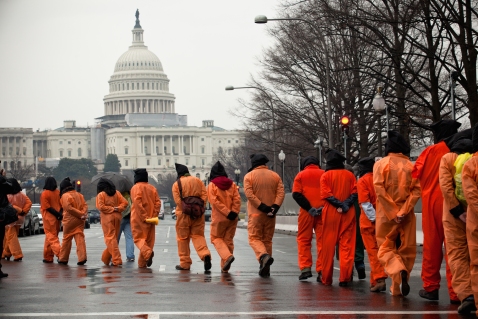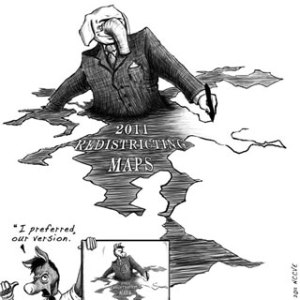International community reiterates calls for Guantanamo’s closure as Congress moves to keep it open

Amnesty International USA activists protest the 10th anniversary of the Guantanamo Bay detention centre, Washington DC, USA, 11 January 2012. – AIUSA
Two major developments took place on Tuesday regarding the ongoing travesty of justice known as Guantanamo Bay. Taken together, the developments once again demonstrate how drastically out of step the United States is with the global community when it comes to human rights and international norms, and in particular how contemptuous the U.S. Congress remains of nearly universal international opinion on the Guantanamo Bay abomination.
On the same day that the U.S. Senate voted 91-3 in favor of a military spending bill that obstructs President Obama’s plans to close the Guantanamo prison camp by prohibiting transfers of detainees, one of Europe’s leading human rights bodies issued a comprehensive report reiterating the international community’s calls to close the detention facility and to either bring the remaining detainees to trial or free them.
The scathing 280-page report issued by the OSCE Office for Democratic Institutions and Human Rights also calls for the full investigation of human rights violations at the prison, including torture, as well as prosecutions of those responsible.
“There is a clear need for full transparency and accountability in addressing the violations of the human rights of detainees, including torture, that have occurred at the Guantanamo detention facility, and as part of the CIA rendition program,” said Omer Fisher, Deputy Head of ODIHR’s Human Rights Department. “Detainees have a right to redress, including access to justice, to compensation, and to medical rehabilitation.”
The report analyses compliance with international human rights standards of the detention and proceedings before U.S. military commissions, demands accountability for human rights violations both at Guantanamo and in the CIA’s illegal rendition and torture program, and specifies the right of victims to claim redress for arbitrary detention and ill-treatment. Regarding the CIA’s rendition and torture program, the report makes clear not only the United States but 27 other OSCE countries are guilty of participating and enabling this gross violation of human rights.
Detention and interrogation practices are examined in some detail. According to the report’s executive summary:
A wide variety of sources, including leaked ICRC reports and official reports have pointed to numerous instances of abuse at Guantánamo under the Bush administration. Interviews with former Guantánamo detainees have provided ODIHR with further information on the severity of abuses inflicted upon them during their detention and interrogations. Practices were reportedly designed to break detainees’ will, cause stress and make them co-operate with and wholly dependent on their interrogators who had total control over their level of isolation, access to comfort items and basic needs such as access to food, drinkable water, sunlight or fresh air. The lack of co-operation with interrogators and non-compliance with constantly changing prison rules were punished, including by the removal of basic items and prolonged isolation. Documented cases corroborated by ODIHR interviews of former detainees indicate the routine use of excessive force against detainees by the Initial Reaction Forces and during the force-feeding of hunger strikers.
Other areas of focus of the report include the use of physical isolation, which “remains the norm for a number of detainees kept in segregated cells with access to two to four hours of recreation per day, alone or with one other detainee.”
The OSCE takes issue with U.S. claims that single-cell confinement does not amount to solitary confinement, noting that “all detainees who spend 22 hours a day in segregated cells are undoubtedly held in solitary confinement.” This isolation “can lead to severe impact on detainees’ health and its effect can be even more pronounced in cases of individuals suffering mental distress from past abuses,” the OSCE points out.
“Solitary confinement combined with the prospect of indefinite detention is even more likely to amount to torture or ill-treatment,” notes the OSCE.
Hunger strikes and force feeding are another area of concern. According to the executive summary:
The reportedly substantial deterioration of confinement conditions during hunger strikes, including the most recent mass hunger strike of 2013 seems to constitute a system of punishment or reward implemented to break the hunger strike and discourage detainees from continuing to protest. Should gathered information be true, such practices would be unjustifiable and would violate a number of international human rights standards, including prison standards and the right of detainees to peacefully protest. It may also violate the prohibition of torture or ill-treatment.
As this report was being published yesterday, the Senate was voting overwhelmingly to thwart Obama’s plans to shutter the Guantanamo facility by maintaining a ban on transferring detainees. The bill adopted Tuesday imposes restrictions on moving any of the 112 remaining detainees to the United States or foreign countries. The measure had passed the house by a vote of 370-58 last week, and although Obama officially opposes the Guantanamo provisions, the White House has indicated that he will sign it into law anyway.
Pentagon spokesman Peter Cook however said that it is premature to say that Congress has blocked the efforts to close Guantanamo. “Let’s wait to see what the plan finally looks like,” he said. “The folks who are crafting that plan have been working very hard on this for months. … This is not going to deter the department from moving forward.”
Even if the plan goes forward, it’s not clear exactly how much impact it would have on ensuring U.S. compliance with international law. Since Obama’s plan would essentially import Guantanamo to the United States while keeping intact the system of indefinite arbitrary detention without charge, the physical closing of the facility in Cuba would largely be symbolic. As a recent letter to the New York Times by Steven W. Hawkins, Executive Director of Amnesty International USA, explained:
The purpose of closing Guantánamo should be to end the human rights violation of indefinite detention without charge — not merely move it to a new location and change Guantanámo’s ZIP code. If the United States does not intend to prosecute a detainee in a fair trial, it should release him. No exceptions.
This call for charging and trying Gitmo detainees or releasing them was echoed by the OSCE report released Tuesday. “Notwithstanding the complexity of the cases before the military commissions, the right to be tried without undue delay has likely been violated in a number of cases,” explained the OSCE. The report goes on:
This right, as recognized under international human rights and humanitarian law and contained in OSCE commitments, applies from the first official charges until the final judgment on appeal. ODIHR is gravely concerned that the US government has intentionally deprived the Guantánamo detainees of this right by excluding the applicability of certain speedy trial rights to cases before the military commissions. The lack of longstanding established procedures and precedent of the military commissions and the hindrances to holding regular hearings due to the remote location of Guantánamo are examples of US government actions that have contributed to the slow path of the proceedings. ODIHR is not aware of particular conduct of the defendants that had led to significant delays. Moreover, lengthy detention, including of 12-13 years in some cases, is likely a violation of the right to liberty and security which applies to pre-trial detention and provides individuals arrested or detained for criminal charges with the right to be tried within a reasonable time or released.
The Director of the OSCE Office for Democratic Institutions and Human Rights, Michael Georg Link, will present the findings of the report Thursday at OSCE headquarters in Vienna. The OSCE is an intergovernmental organization whose membership includes all of the member countries of the European Union, NATO and the Commonwealth of Independent States. The U.S. is one of its charter members, having signed its founding document, the Helsinki Final Act, in 1975.
To join the international grassroots campaign to close Guantanamo, click here.
MSF report bolsters claims of U.S. war crime in Kunduz

The Doctors Without Borders hospital in Kunduz, Afghanistan, after it was destroyed by a U.S. gunship on Oct. 3, 2015.
A damning new report released Thursday by Doctors Without Borders (MSF) contains new – and sometimes shocking – details regarding the U.S. airstrike last month on its hospital in Kunduz, Afghanistan. The preliminary report offers a thorough account of the days leading up to the attack and the assault itself, which lasted for approximately an hour, placing the onus on the United States to now refute, clarify or explain the circumstances surrounding the vicious attack by an AC-130 gunship in the early morning hours of Oct. 3, 2015.
In its report, MSF rebuts claims that the hospital had been used as a “Taliban base” and confirms that its strict no-weapons policy was in effect, meaning that none of the occupants inside the trauma center were combatants and therefore had protected status under international humanitarian law.
The charity also reiterates that it had provided the precise coordinates of the hospital to the U.S. military just days before the assault, and that “confirmation of receipt was received from both U.S. Department of Defense and U.S. army representatives, both of whom assured us that the coordinates had been passed on to the appropriate parties.”
 In a previously undisclosed detail, MSF reveals that the United States government had inquired just two days before the strike whether there were any Taliban “holed up” in the facility, to which MSF replied that “the hospital was full of patients including wounded Taliban combatants.” According to MSF, there were approximately 20 Taliban patients in the hospital and three or four wounded government combatants.
In a previously undisclosed detail, MSF reveals that the United States government had inquired just two days before the strike whether there were any Taliban “holed up” in the facility, to which MSF replied that “the hospital was full of patients including wounded Taliban combatants.” According to MSF, there were approximately 20 Taliban patients in the hospital and three or four wounded government combatants.
Nevertheless, “Not a single MSF staff member reported the presence of armed combatants or fighting in or from the hospital compound prior to or during the airstrikes.”
The harrowing account of the horrific assault carried out on the hospital is enough to make your stomach turn, thinking about the bravery of these medical workers carrying out a vital humanitarian mission, only to be incinerated, decapitated, dismembered and shot down in cold blood by a massive military gunship circling the clearly identified hospital for an hour.
In one passage, MSF describes a grisly scene of death and mayhem as victims were gunned down by the U.S. warplane as they attempted to flee for safety:
Many staff describe seeing people being shot, most likely from the plane, as people tried to flee the main hospital building that was being hit with each airstrike. Some accounts mention shooting that appears to follow the movement of people on the run. MSF doctors and other medical staff were shot while running to reach safety in a different part of the compound.
One MSF staff member described a patient in a wheelchair attempting to escape from the inpatient department when he was killed by shrapnel from a blast. An MSF doctor suffered a traumatic amputation to the leg in one of the blasts. He was later operated on by the MSF team on a make-shift operating table on an office desk where he died. Other MSF staff describe seeing people running while on fire and then falling unconscious on the ground. One MSF staff was decapitated by shrapnel in the airstrikes.
Another passage describes an MSF nurse who was covered from head to toe in debris and blood “with his left arm hanging from a small piece of tissue after having suffered a traumatic amputation in the blast.”
The group also provides a detailed timeline of their real-time communications with the United States military and other relevant actors as the carnage unfolded, imploring them to call off the attack, all to no avail. MSF reveals that they communicated with their U.S. military contacts in Kabul and Washington no fewer than six times during the course of the assault, all the while bombs just kept landing on their hospital:
Summary phone log of contacts MSF made during the US airstrikes
MSF made multiple calls and SMS contacts in an attempt to stop the airstrikes:
– At 2.19am, a call was made from MSF representative in Kabul to Resolute Support in Afghanistan informing them that the hospital had been hit in an airstrike
– At 2.20am, a call was made from MSF representative in Kabul to ICRC informing them that the hospital had been hit in an airstrike
– At 2.32am a call was made from MSF Kabul to OCHA Civil Military (CivMil) liaison in Afghanistan to inform of the ongoing strikes
– At 2.32am a call was made by MSF in New York to US Department of Defense contact in Washington informing of the airstrikes
– At 2.45am an SMS was received from OCHA CivMil in Afghanistan to MSF in Kabul confirming that the information had been passed through “several channels”
– At 2.47am, an SMS was sent from MSF in Kabul to Resolute Support in Afghanistan informing that one staff was confirmed dead and many were unaccounted for
– At 2.50am MSF in Kabul informed Afghan Ministry of Interior at Kabul level of the airstrikes. Afghan Ministry of Interior replied that he would contact ground forces
– At 2.52am a reply was received by MSF in Kabul from Resolute Support stating “I’m sorry to hear that, I still do not know what happened”
– At 2.56am an SMS was sent from MSF in Kabul to Resolute Support insisting that the airstrikes stop and informing that we suspected heavy casualties
– At 2.59am an SMS reply was received by MSF in Kabul from Resolute Support saying ”I’ll do my best, praying for you all”
– At 3.04am an SMS was sent to Resolute Support from MSF in Kabul that the hospital was on fire
– At 3.07am an SMS was sent from MSF in Kabul to OCHA CivMil that the hospital was on fire
– At 3.09am an SMS was received by MSF in Kabul from OCHA CivMil asking if the incoming had stopped
– At 3.10am and again at 3.14am, follow up calls were made from MSF New York to the US Department of Defense contact in Washington regarding the ongoing airstrikes
– At 3.13am an SMS was sent from MSF in Kabul to OCHA CivMil saying that incoming had stopped
– At 3.15am an SMS was received from CivMil OCHA stating that information had been passed to Resolute Support in the North and CJOC in Kabul as well as ANA in Kabul and the North
– At 3.18am an SMS was sent from MSF in New York to US Department of Defence contact in Washington that one staff was confirmed dead and many were unaccounted for
As this blog has previously pointed out, it stretches credulity that the U.S. was unaware that the target was a hospital before launching the attack. Giving the U.S. the benefit of the doubt, however, that the initial strike may have been the result of some sort of bureaucratic snafu, the fact that U.S. and Afghan military officials were again informed after staff at the hospital became aware of the bombardment, and yet continued to bomb for another half-hour, should put to rest the notion that the attack was just a “mistake.”
The MSF report issued yesterday provides further circumstantial evidence that this was indeed a premeditated war crime, providing an obvious motive of the United States – the elimination of the 20 Taliban patients inside the hospital and the denial of future medical care to enemy combatants. MSF is fairly straightforwardly asking the United States, in fact, whether 151 years of international law still applies in this conflict, or whether hospitals and medical workers are now considered “fair game” by the U.S. military.
As MSF President Joanne Lieu wrote in the introduction to the report, “The attack on our hospital in Kunduz destroyed our ability to treat patients at a time when we were needed the most. We need a clear commitment that the act of providing medical care will never make us a target. We need to know whether the rules of war still apply.”
It is now up to the United States to provide answers, and if the answer is “yes, the rules of war apply,” then the natural follow up should be to place under arrest whoever was responsible in the chain of command for ordering, authorizing and carrying out this heinous war crime. To add your name to a petition demanding that President Obama allow an independent investigation to take place, click here.




